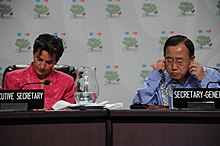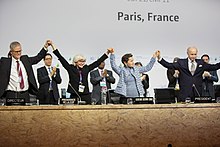Christiana Figueres
In 1994, Figueres re-entered professional life and became the Director of the Renewable Energy in the Americas (REIA) initiative, today housed at the Organisation of American States (OAS).
[21] In 1995 Figueres founded and became the executive director of the Center for Sustainable Development in the Americas, a non-profit organization dedicated to promoting the participation of Latin American countries in the Climate Change Convention.
In 2005 she published a study proposing "programmatic CDM" whereby emission reductions are achieved not by one single site, but rather by multiple actions executed over time as the result of a government measure or a voluntary program.
She then took the lead in negotiating the concept with the various groups of industrialized countries, finally attaining a Conference of the Parties (COP) decision to allow "programs of activities" in the CDM.
[41] She was the Principal Climate Change Advisor to ENDESA Latinoamérica, the largest private utility in Latin America with operations in Argentina, Brazil, Chile, Colombia and Peru.
[22] During her tenure as Executive Secretary, she led the UN Climate Change Secretariat's delivery of six consecutive yearly global negotiation sessions, culminating in the historical Paris Agreement in December 2015.
[46][47] Her engagement and close collaboration with yearly rotating presidencies (Mexico,[48] South Africa,[49] Qatar,[50] Poland,[51] Peru[52] and France[53]) provided the necessary framework and continuity that allowed every annual negotiation to build incrementally solid ground of common purpose.
Under the presidency of Patricia Espinosa (Mexico) COP16[54] in 2010 marked a radical departure from the previous conference in Copenhagen, delivering a comprehensive package infrastructure to assist developing nations including the Green Climate Fund, the UNFCCC Technology Mechanism,[55] and the Cancun Adaptation Framework.
[62] At COP19 in Warsaw in 2013[63] governments continued to work toward the global framework but also adopted a rulebook for reducing emissions from deforestation and forest degradation and a mechanism to address loss and damage caused by long-term climate change impacts.
Gathering in Lima for COP20 at the end of 2014,[64] governments defined the core elements of the upcoming agreement, and agreed on the ground rules to submit national contributions in the run up to the 2015 negotiation.
[66] On the final day under the presidency of Laurent Fabius the 195 governments which are Parties to the Climate Change Convention unanimously adopted the Paris Agreement, with the goal of accelerating the intentional transformation of the global economy toward low carbon and high resilience.
[74] After her tenure as Executive Secretary, Figueres worked as convenor of Mission 2020[75] and served as chair of the advisory board of The Lancet Countdown: Tracking Progress on Health and Climate Change.
[7] During the UN Secretary General debate held by Al Jazeera, Christina Figuerres raised her hand when the candidates were all asked who thought victims of cholera deserved an apology.


